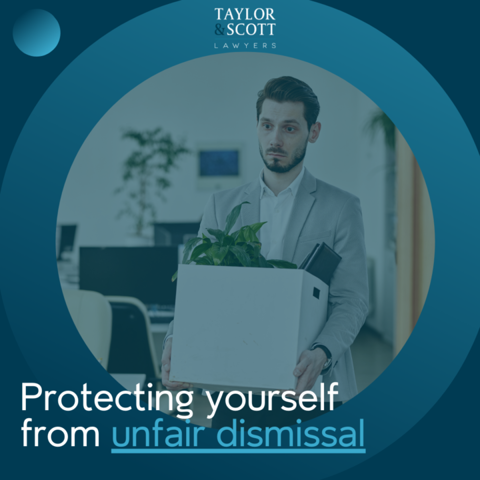Facing an unfair dismissal can be devastating. In this article, we will discuss what unfair dismissal is and how to protect your rights when confronting an unfair dismissal in NSW.
What is Unfair Dismissal?
An unfair dismissal is when an employee is sacked from their job harshly, unjustly or unreasonably. Employers must ensure that any termination of employment is based on lawful reasons and sufficient notice is given.
Signs Of An Unfair Termination
If you believe your employment has been terminated unfairly, there are specific criteria you can assess to determine if this is the case.
Always seek legal advice from an experienced employment lawyer to determine your legal rights.
Generally, an unfair dismissal involves an employer not following the correct procedures when terminating someone's employment or failing to provide adequate reasons for the dismissal. If the dismissal was based on discriminatory grounds, this may also constitute an unfair dismissal, or could be challenged using different legal protections.
Unfair Dismissal Options
When you've been unfairly dismissed, it's important to know your rights and what you can do. If your situation fits the criteria for unfair dismissal, you can go to court and ask for money to make up for what you've lost.
Settlements can include wages, benefits, and other losses caused by the employer. Employers may be willing to negotiate a settlement with you outside of court. Sometimes, reinstatement is ordered, although this is relatively rare.
In any case, a lawyer can look at the evidence and tell you what the best thing to do is in your case.
Types of Unfair or Unlawful Dismissals
As well as bringing a claim for unfair dismissal, there are two other main ways of fighting wrongful dismissals: a general protection dismissal and unlawful termination (where general protections are not available).
Harsh, unfair or unjust dismissal occurs when an employer does not have adequate reasons for dismissal, or the employee is terminated without adequate warning, and/or the employer has not taken into account the employee's length of service, performance history, and personal circumstances.
Dismissal contrary to an employee's general protections, occurs when an employee is dismissed because they have exercised a workplace right, such as taking parental leave, joining a union, or making a complaint, or have engaged in industrial activity. Dismissal for a discriminatory reason can also be challenged as a general protections dismissal.
Examples of Unfair Dismissals or General Protections Dismissals
Unfair or unlawful dismissals occur when an employer terminates an employee $B!G (Bs role without due process or a valid reason, or for a prohibited reason. Some examples of unfair dismissal and unlawful dismissals include:
#1 Terminating an employee because they exercise their workplace rights. Employees are free to:
- Make complaints (to employers, Fair Work Commission, Australian Taxation Office, Fair Work Ombudsman, WorkSafe or any other relevant institution).
- Inquire about anything to do with their employment.
- Take leave (eg sick, annual, long service and maternity).
- File a workers $B!G (B compensation claim or join a union.
#2 Sham redundancy
We often see situations where employees are terminated based on an alleged redundancy, but after some investigation, it becomes evident that the redundancy wasn't genuine.
#3 Terminated due to discrimination
An employer can face serious consequences for any termination based on Race, Colour, National extraction or social origin, Sex, Sexual orientation, gender identity, intersex status, Age, Physical or mental disability, Marital status, Family or carer's responsibilities, Pregnancy, Breastfeeding, or subjection to family and domestic violence.
#4 Terminated for poor performance
Poor-performing employees should be given a reasonable opportunity to improve before they can be dismissed. You may be able to lodge an unfair dismissal claim if your employer:
- Did not provide proper training.
- Did not explain your performance is lacking.
- Did not give reasonable time to improve.
- Wrongly blamed you for performance breaches.
- Did not warn termination was possible if performance did not improve.
- Did not explain reasons why performance did not meet expectations.
#5 Terminated for no reason
You may be able to make an unfair dismissal claim if your employment is terminated without explanation.
#6 Terminated without due process
You may be able to make an unfair dismissal claim if your employment is terminated without your employer following the proper process.
#7 Misconduct you did not commit
If an employer fires you for doing something wrong (misconduct), but the accusations are incorrect, you may be able to lodge an unfair dismissal claim.
#8 Forced resignation
When an employee resigns after being forced to do so, the law sometimes considers that termination at the initiative of the employer. That employee may then claim unfair dismissal.
#9 Reason does not justify dismissal
An unfair dismissal can be claimed if the reason for dismissal is insufficient to justify termination.
There is a minimum employment period of six months before you can bring some of these claims, but not general protections claims. That $B!G (Bs why you should seek legal advice.
Protect Yourself from an Unfair Dismissal?
Employees should be aware of their rights when it comes to unfair dismissal. Some proactive steps to prepare yourself for an unfair dismissal include:
- Ensure you have clear documentation of your responsibilities at work.
- Familiarise yourself with workplace policies and relevant laws to ensure they treat you lawfully during the dismissal process.
- Document any instances of discrimination or harassment and any attempts to resolve disputes before leaving the company.
- Document any conversations or meetings with your employer regarding the dismissal, as this can be used as evidence.
When faced with unfair dismissal, it can feel like your world has come crashing down. But don't despair! There are plenty of ways to try to get your job back or take legal action and seek compensation for your losses. Talk to the experts.




